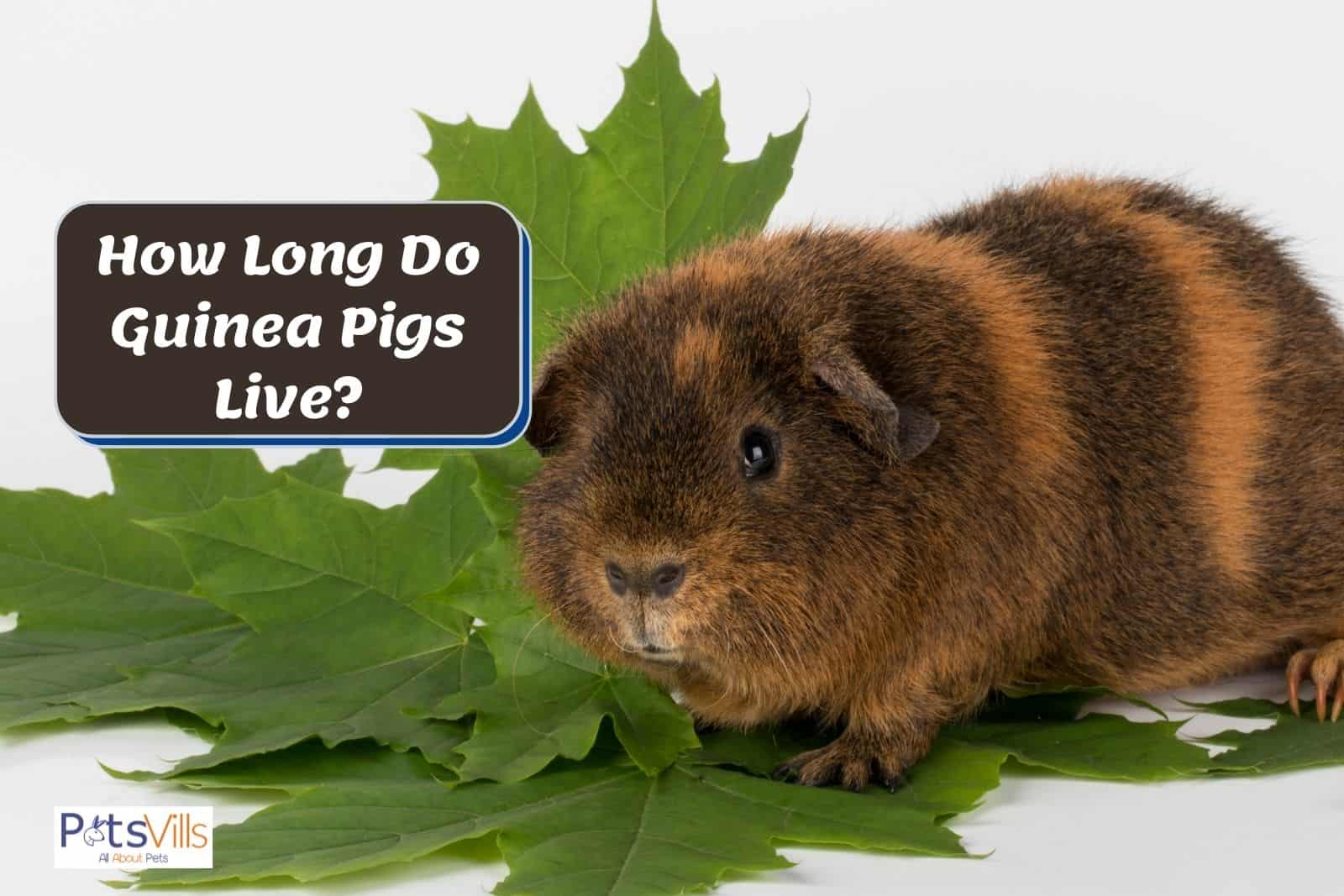Guinea pigs are nice pets to own. They are not just fun to look after, but they can also be the perfect company during one of those long boring holidays.
Of course, Guinea pigs are renowned for living longer than most other pet rodents, and that can mean more responsibility and stronger commitment on your part as a guinea pig owner, but how long can this amazing animal live?”
How Long do Guinea Pigs Live For? Guinea pigs live averagely between five to seven years, although in some exceptional cases, they may live a few years shorter or longer than the normal years.
The longer life span of guinea pigs compared to most other pet rodents make them the preferred choice for rodent lovers that want to enjoy longer company with their pets.
Quite a lot of parents prefer to get guinea pigs for their children during growing up days as it is a great way to introduce them to responsibilities early on into their lives and to help them learn how to care for animals.
Check: Guinea Pigs Sounds and Body Language
Table of Contents
What is a Guinea Pigs Life Expectancy?
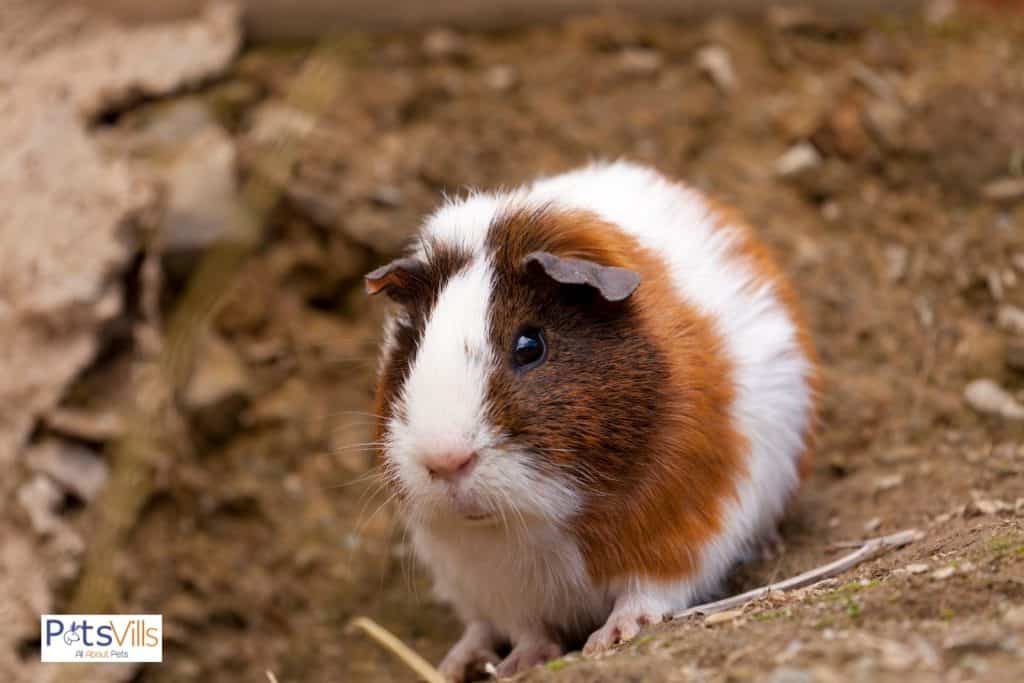
Like we stated earlier, the average lifespan of a guinea pig falls between 5-7 years. However, on a few occasions, some guinea pigs may die before they get to five years, while a few others will live longer than 7.
By caring well for a guinea pig, you will be giving it an excellent chance to live a long healthy life. You should also understand that their level of longevity is also affected by more natural characteristics like their genes.
This is the reason why you should ask about your potential piggy’s parents before buying one, because if the parent of the guinea pig lived healthily to a ripe old age, then there is a better chance that yours will live longer as well.
In a few situations too, the lifespan of a guinea pig can be affected by its breed. In-breeding has been found to cause a certain level of weakness in pets; hence, this can significantly affect their life expectancy.
Life Cycle of a Guinea Pig
To help you properly understand the lifestyle of your guinea pig, it is also vital that we explain the lifecycle of this adorable pet to you.
We will classify the lifecycle of a guinea pig into four, including; birth and infancy, youth, adulthood, and old age.
Birth and Infancy
Usually, the gestation period of most guinea pigs lasts between 60-70 days, although we’ve heard of a few exceptional cases where the gestation period lasts more than 70.
Keep in mind, however, that it is mostly between the range of days highlighted above.
Once guinea pigs give birth to their pups, they stay as close as possible to the pups, giving them the warmth they need and food for up to 30 days.
Males mature enough for reproduction in as little as three weeks, hence, the need for gender separation of pups before this time.
Youth
Guinea pigs team their pups between 3 to 4 weeks after birth. Once weaned, the pups are expected to begin eating grasses and hays, then pellets.
Guinea pigs are so friendly that they will neither bite nor scratch unless they are provided or frightened. They are classified among the more docile rodents.
As rodents begin to mature, they develop groups of male-dominated hierarchies. At this stage of the guinea pigs’ lifecycle, you should pay more attention to harmful aggressive tendencies that they may begin to develop.
When you notice things like injuries, fearfulness, then they are all pointers to the fact that the males should be separated.
Adulthood
Guinea pigs at their adult stage are pretty vocal; a female guinea pig, for instance, will charter and click to comfort their young.
Happy guinea pigs, on the other hand, will be seen bubbling and purring, while stressed-out guinea pigs will rumble.
Be careful about trying to pick up a guinea pig when they are rumbling they may have more tendency of biting or scratching you at this point. Excited guinea pigs “wheek” too, a sound made by guinea pigs when anticipating something; mostly food or play.
READ MORE: Do Guinea Pigs Have to be in Pairs?
Old Age and Death
The average life expectancy of guinea pigs falls between 5 and 7 years. Like the average human being, a guinea pig also suffers from age-associated ailments like cataracts and arthritis too.
One of the most common issues noticeable in most older guinea pigs is the issue of dry skin, and this can be handled by adding little soybean oil or safflower to their food.
If at old age, your guinea pig falls into an illness that they are unlikely to be completely well from, then you may need vet-assisted euthanasia. Contact your vet to talk about the options available to you.
Check: Guinea Pigs Eye Problems
Oldest Guinea Pig in the World
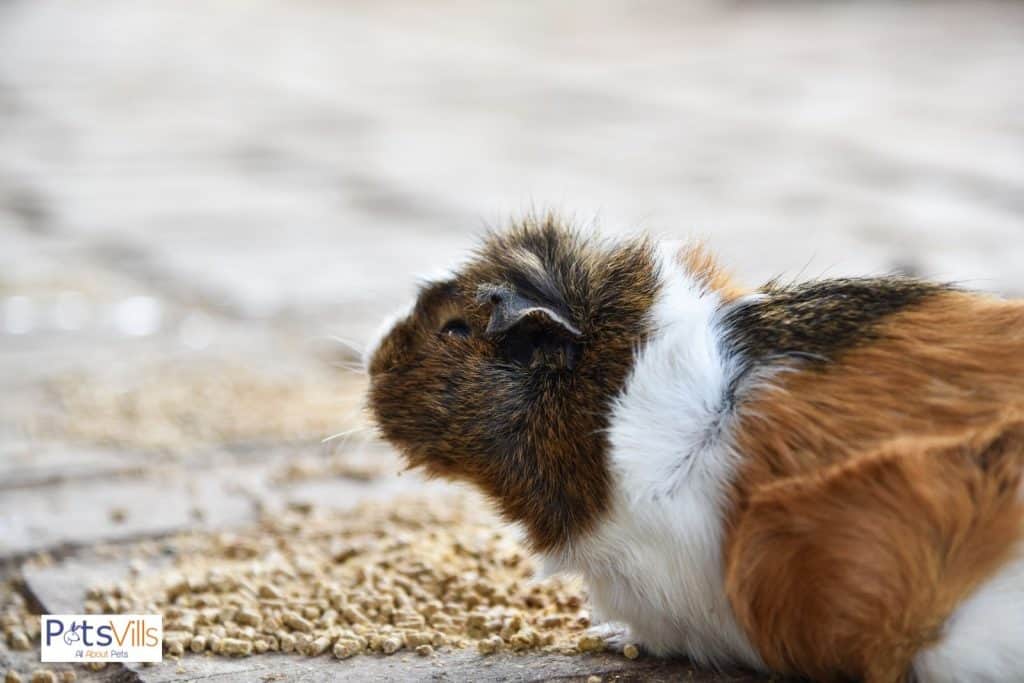
Despite been proven to live within an average of 5-7 years, we’ve also seen a few cases where guinea pigs outlive this age.
In fact, there are quite a number of instances where we’ve seen guinea pigs beat this age number by incredible margins.
One of such cases is one that holds the present Guinness world’s record as the oldest guinea pig in history. This guinea pig lived for a record 14 years and 10.5 months. It was named Snowball, and it died in February 1979.
How to Help Your Guinea Pig Enjoy Longer Life
Do you know that you can help your guinea pig live longer?
Like it is with most other pets, there are some measures that you can take to help improve the health of the guinea pig, therefore helping it to live longer. Here, take a look at some things that can be done to help:
The Diet Matters – How a Good Diet Affects Your Guinea Pig’s Lifespan
Like it is with humans, guinea pigs too need to eat right if they must remain healthy and strong for as long as you desire.
In fact, food is the most essential thing to think about if you want to help your guinea pig. Experts advise that you provide a balanced diet at all times.
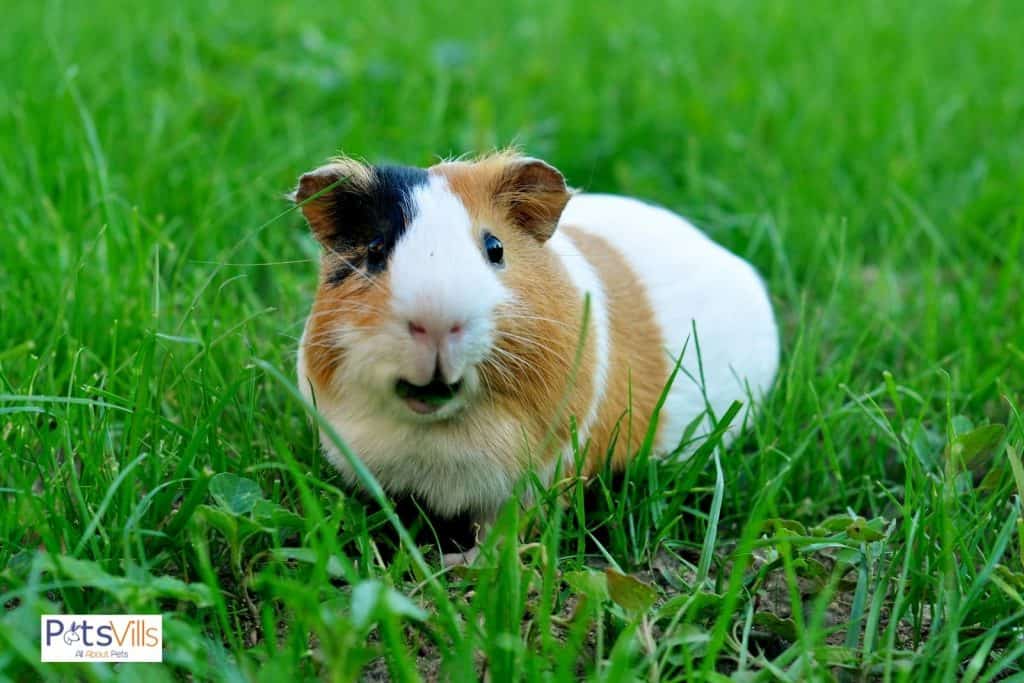
Usually, the foundation of the food that your guinea pig takes should consist of grass hay. This is advised because grass hays are a popular source of fiber and help to keep the teeth of your pet down.
It is imperative that every guinea pig owner gives their guinea pigs constant access to grass hay and other important sources of food.
There’s a big debate among animal health experts about guinea pug foods sold in pet shops. While some favor the purchase of ready-made guinea pig food from pet stores, others think that it is terrible.
Whatever your decision, however, you need to avoid guinea pig foods that are high in calcium, which can potentially cause urinary infections.
A trip to a pet shop or equestrian center would reveal several types of grass hay to you, so there’s bound to be a lot of options available to you.
As much as possible, separate the hay from the bedding. You wouldn’t like for your animal to eat in the same place where they use it as a toilet.
Guinea pigs enjoy fresh, organic well washed leafy greens, so you can give them a treat by preparing it for them. The options available here include green leaf lettuce, red leaf lettuce, escarole, cilantro, and curly endive.
Once in a while, you can introduce a few pieces of apple and strawberries to their diet. However, don’t exaggerate it, as guinea pigs are prone to obesity.
Make Sure Their Cage is Big Enough
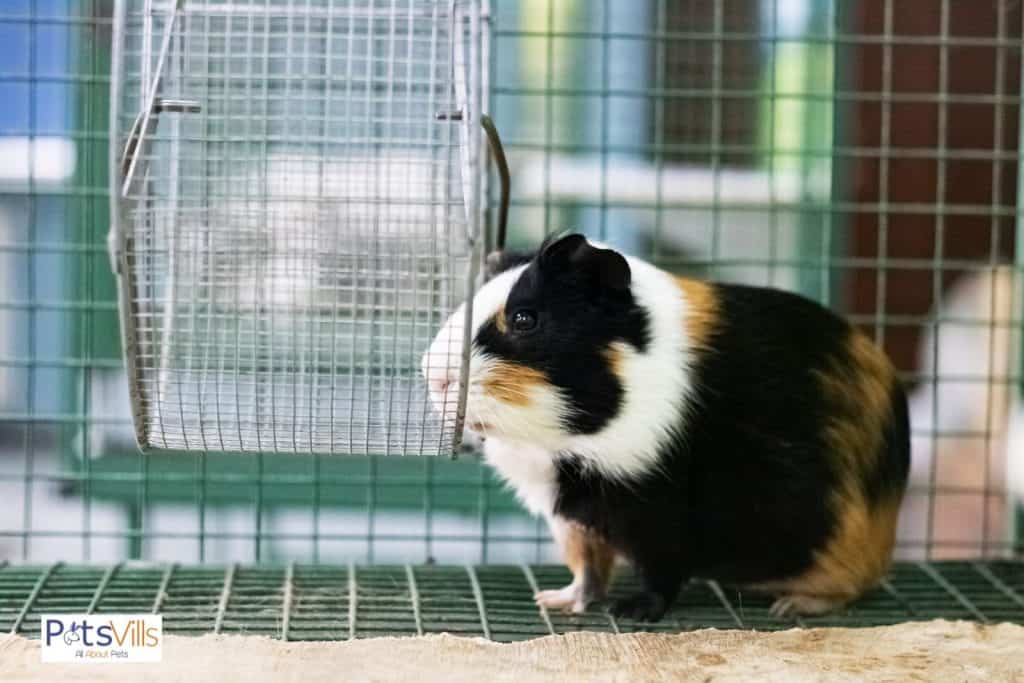
As part of the steps that you can adopt to ensure good health and longevity for your guinea pig, you need to buy them the right cage.
By right cage, we mean that you need to provide for them a cage that has the right size and the right atmosphere for conducive living. Just like you, your pets desire to live in the best condition possible.
If you own two guinea pigs, then a cage of at least 10 square feet would be needed to keep them. This size of space helps for the prevention of unnecessary conflicts and fighting among guinea pigs.
The adequate space provided by big enough cages also gives room for regular exercising, therefore, reducing the risks of obesity, bloat, and gas build-up.
When you go to buy a cage for your animal, look at a few different ones, paying attention to ease of cleaning, as much as you would do for size.
Have it in mind that you would need to clean regularly; hence, the need to buy one that your hand can enter well during cleaning.
Apart from size and cleaning ease, also make sure that the cafe you are going for has enough light to keep your guinea pigs in a good mood.
Your choice cage should also have a dark corner, where your guinea pigs can hide when they want to sleep. At all times, your cage should be placed in a location with a good and stable temperature.
Additionally, get good bedding for the floor of the cage and change as often as possible because you don’t want your guinea pig to live in its feces.
READ MORE: Why Does My Guinea Pig Smell Bad?
Provide Them With Lots of Exercises
We might have brushed on this in the previous point, but we still need to discuss more on it for emphasis purpose, because truly, it is very important. Guinea pigs, in their very nature, need constant exercising to remain healthy.
Guinea pigs love food, and with all the attention you will pay to always providing them fresh food and hay, there is a good possibility that they will often overfeed, hence, become prone to obesity.
Obesity is advised against in guinea pigs because it can lead to quite a few health issues in the life of your guinea pig.
It is for this reason that exercise is crucial. This is part of why we advised that you get a bigger cage since it offers them enough room to run around, do laps and have fun generally.
Buying toys can also help to encourage exercises in your pets; however, you need to be careful not to get their floor space overcrowded with toys.
Please note that exercise wheels are strongly advised against as they are not designed for guinea pigs.
Health Problems That Could Affect Their Lifespan
While guinea pigs are relatively easy to take care of, you must be careful to ensure that they don’t fall into a life-ruining health issue.
Of course, they are mostly healthy, but can also be susceptible to certain diseases once in a while. Here is a list of some of the common problems that guinea pigs face.
We’ve listed these problems so that you can be familiar with them and take prior actions against them when they ever come up before they cause any major problem to your guinea pig.
The most prevalent health issues that guinea pigs may face include:
- Respiratory infections
- Diarrhea
- Tumors
- Vitamin C deficiency
- Urinary problems
- Lice infestations
- Mites infestations
- Fungus infestation.
FAQs
Which breed of guinea pig lives the longest?
The longest living breed of guinea pigs is the Texel guinea pigs. The American guinea pig is also found to live longer too, but there’s a need for proper care.
Do guinea pigs shed?

Yes, guinea pigs do shed and shedding is completely normal for them. Long-haired guinea pigs typically shed more.
Do guinea pigs die from loneliness?
Yes, a guinea pig can actually die of loneliness. If left withdrew from a partner for too long, they sometimes fall ill making them prone to death.
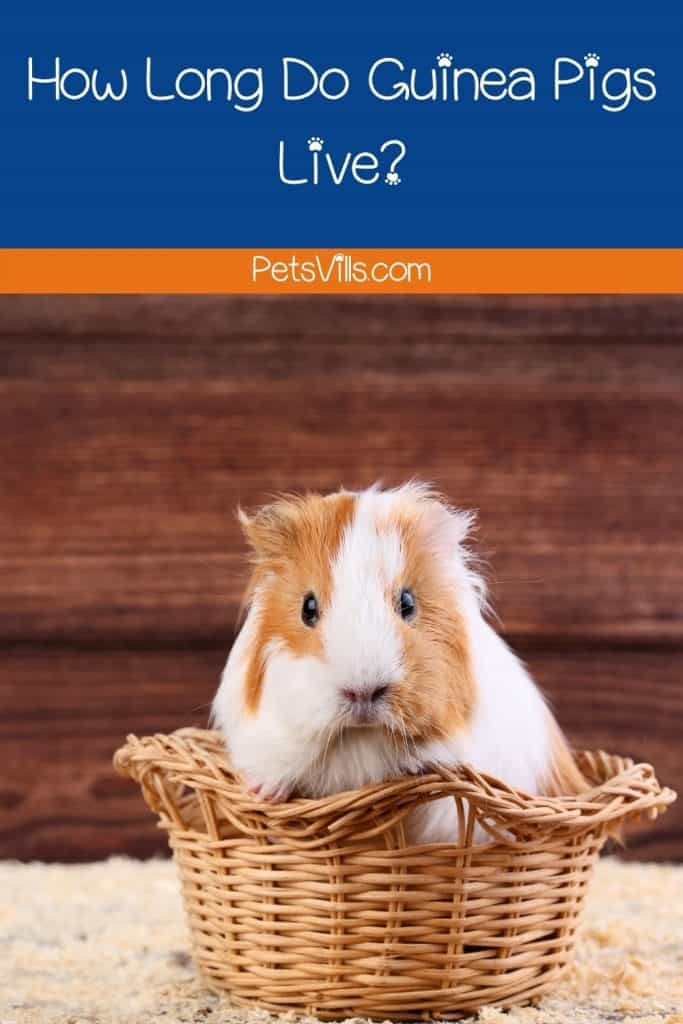
How oldest guinea pig did you ever have? Let us know in the comments below!
Alina Hartley is a small-town girl with a ginormous love of bearded dragons. It all started with Winchester, a baby bearded who was abandoned at the shelter by his former owners because of a birth defect that caused one front leg to be shorter than the other. Alina originally went to the shelter looking for a guinea pig, but one look at Winchester and it was love at first sight. From that day on, Alina has dedicated her life to learning everything she can about bearded dragons. She loves helping new beardie parents start their incredible journey with these magnificent reptiles.
Follow her on:
LINKEDIN
TWITTER.
Read her latest articles HERE
Learn more about her HERE.

